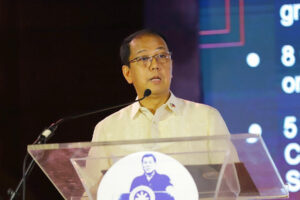Seaborg’s modular nuclear reactors ‘a very good

DANISH NUCLEAR technology company Seaborg is keen on bringing its know-how in small modular reactors to the Philippines as the country explores adding nuclear power into its energy mix.
“The three things that we are looking at is wind — and that’s both onshore and offshore; solar; and small modular reactors (SMR),” Franz-Michael Mellbin, Royal Danish Embassy’s ambassador to the Philippines, told reporters last week.
He made the statement on the sidelines of a service contract signing between the Philippines, through the Department of Energy, and Copenhagen Infrastructure New Markets Fund. The Danish entity is planning to develop the Philippines’ first 100% foreign-owned offshore wind project.
Aside from offshore and onshore wind farms, Denmark’s companies are also interested in exploring other projects in the Philippines, Mr. Mellbin said.
“I think the big difference between the Danish SMR technology and those you see in other countries like the US is that our solution is sea-based,” he said. “This solves a lot of issues with the licensing, the permitting, but also with waste management.”
Mr. Mellbin added that the time to develop Denmark’s small nuclear reactors is faster than land-based technologies, making it shorter to bring their output to the electricity market.
“For these reasons, I think there is a very good match between the needs of the Philippines and the potential of this Danish technology,” he added.
Mr. Mellbin said the Danish embassy had already reached out to the Philippine Nuclear Research Institute, a state agency mandated to undertake research and development activities on nuclear energy, for a possible “cooperation.”
He said Denmark’s SMR technology would be affordable and applicable to the Philippines, in part, because it is seaborne.
“It’s done together with Korea, which has a very well-established nuclear sector. And because the licensing and the IAEA (International Atomic Energy Agency) approvals can be done by the Koreans for the floating solution, it allows for easy deployment in third countries also,” he said.
IAEA is the world’s center for cooperation in the nuclear field. The intergovernmental organization promotes the safe, secure, and peaceful use of nuclear technology.
On its website, Seaborg said that it owns and operates “multiple laboratories” and that it is underway “to license the next generation of nuclear reactors.” It added that the introduction of intermittent renewables into the power grid needs to be complemented with stable sources such as nuclear energy. — Victor V. Saulon




